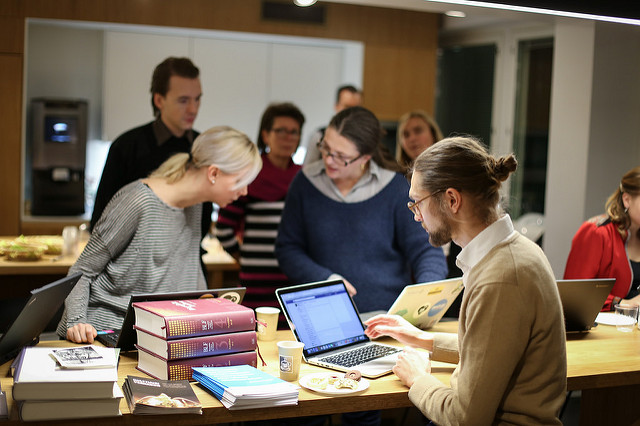Building Community to Activate Growth Mindset
For students to truly believe that they can improve with practice, educators need to help them identify as learners who are surrounded by people who share their skills and goals.
By Jan Bryan
Every teacher knows their classroom isn’t just a space where individuals gain knowledge. It’s the center of a community in which students come together to learn and grow. In the best-case scenario, that community comprises not only the people in the room, but the students’ families and every educator and staff member in the school and district. How can teachers and educators build communities of learning that extend beyond their classroom walls and even the barriers of their districts? By working to instill a growth mindset in their students and everyone around them.
Measurable Benefits of Growth Mindset
The mindset is the through-line. It’s the energy. If you’re going to have a community in the classroom, children need an identity to which they belong. Popularized by Stanford Psychology Professor Carol Dweck, the growth mindset is a set of beliefs, a frame of mind in which individuals believe intelligence and other skills can be improved with practice and training. This is opposed to a fixed mindset, in which people believe that they have a certain amount of skill or talent that is inborn and can’t be improved.
But growth mindset doesn’t just help students understand that they can learn. It helps them solve problems right now. A 2015 functional magnetic resonance imaging (FMRI) study from Stanford found that even when controlling for IQ, age, working memory, math anxiety, and reading ability, students with a growth mindset regarding math were better able to identify correct and incorrect answers to math problems. As researcher Lang Chen told Education Week in 2015, “Beyond the emotional or even motivational story of ‘positive mindset,’ there may be cognitive functions supporting the story.”
Getting the Conversation Started
One fascinating thing about growth mindset is that it’s tied into cultural beliefs that come in and out of fashion. If you look at Aesop’s fables, he’s talking about growth mindset. “The Tortoise and the Hare” is about growth mindset. The Little Engine That Could is a book about growth mindset, with the main character repeating, “I think I can, I think I can.”
That means we’re already talking about these ideas culturally. They’re already part of family discussions, part of child-rearing. There’s a starting point for having these conversations with teachers and family members.
Another important thing to keep in mind about growth mindset is that it’s not static, like an on/off switch. The mindset is situational, so a student might have a growth mindset regarding literacy, but not math—or they may feel on one day that they can improve their reading skills through practice, but the next day they may be more easily discouraged.
Taken together, these two things mean that we can help children to develop a growth mindset regarding just about anything. How can students’ families become part of the community and help encourage that?
Connecting Students, Parents, and Teachers
Reading with their children at home, going over their homework with them, and encouraging their hard work rather than praising them for being smart is a great start. With math, and particularly with something like Common Core math, where parents and guardians might not be familiar with newer methods, it’s important to open lines of communication with teachers so both sides feel comfortable and neither feels intimidated or burdened by at-home help with homework.
Decades ago, Education Researcher E.D. Hirsch published a book called Cultural Literacy in which he argued that students are being over “skillified” in schools, ideas he’s revisited more recently in his 2017 book Why Knowledge Matters. He said that we were teaching children, say, math skills, but that learning is dependent upon the process they were taught rather than on understanding the math itself.
An example from my own life illustrates quite well how this works with literacy. When I took the Graduate Record Examination (GRE), there was a section on it about the pancreatic isthmus. I thought it was an island, being familiar with that use of the term, and I was so confused. I had the skill of reading down pat—I was a successful college student, after all—but I still had to take the test a second time because that skill on its own wasn’t enough to pass the test. Students need background knowledge as well.
Now, of course we can’t prepare students with background knowledge for every possible subject, but we can teach them that failure is where learning happens. We don’t always succeed the first time, and sometimes we have to go back over and over and over again, just as I had to go back and retake the GRE.
A big key to helping students develop a growth mindset is giving them a sense of belonging to a community. Take, for example, a student who gets help with math at home. That student sees their parent, guardian, or sibling as someone who can do math. They share other things in common with them as well, such as eye color, a last name, or the place they live. Those common characteristics make them feel like, “Well, if they can do math, I can do math.”
The commonalities don’t have to be something earth-shattering or even all that significant. Author Daniel Coyle talks about a study in which two groups of students were given a problem to solve. One group was told someone else had already solved it. The other group was told it had been solved by a mathematician who shared their birthday. The second group was much more likely to solve the problem, and Coyle suggests that it was because they believed they had something in common with the fictional mathematician who had previously solved it.
Growth mindset is a transitorytate of mind, but the good news is that it can be activated and individuals can learn to adopt it. The first step in doing that for our students is to help them build an identity and to provide them a community—a community of readers, a community of mathematicians—that their identity can belong to.
Jan Bryan is vice president and national education officer at Renaissance®. She holds a doctorate of education in literacy and education psychology from Texas Tech University.




